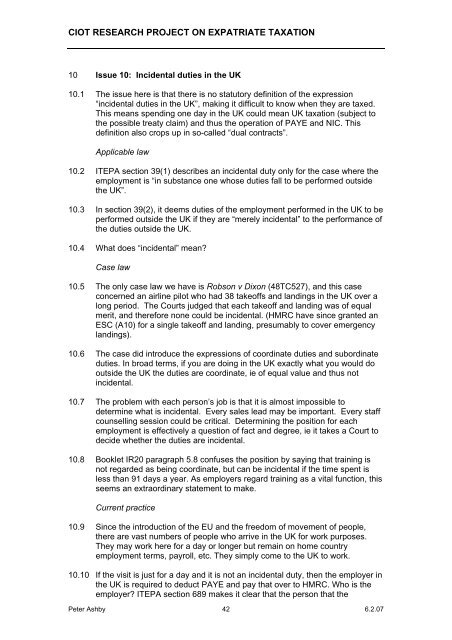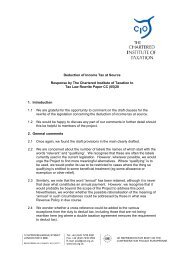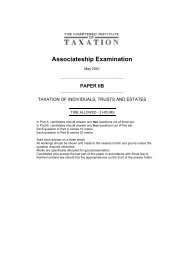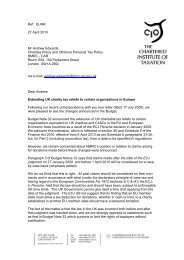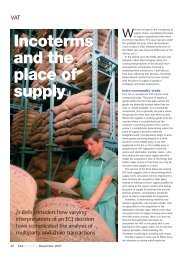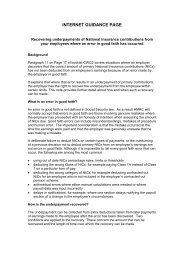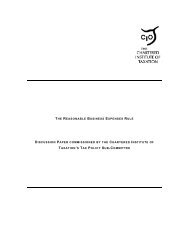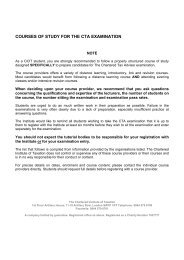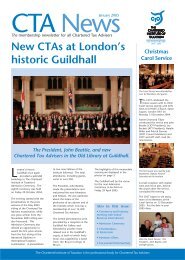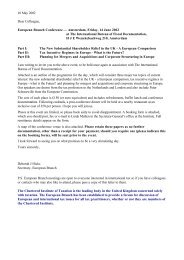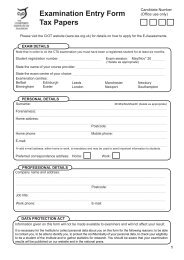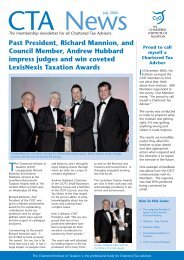Expatriate taxation - CIOT - The Chartered Institute of Taxation
Expatriate taxation - CIOT - The Chartered Institute of Taxation
Expatriate taxation - CIOT - The Chartered Institute of Taxation
Create successful ePaper yourself
Turn your PDF publications into a flip-book with our unique Google optimized e-Paper software.
<strong>CIOT</strong> RESEARCH PROJECT ON EXPATRIATE TAXATION<br />
10 Issue 10: Incidental duties in the UK<br />
10.1 <strong>The</strong> issue here is that there is no statutory definition <strong>of</strong> the expression<br />
“incidental duties in the UK”, making it difficult to know when they are taxed.<br />
This means spending one day in the UK could mean UK <strong>taxation</strong> (subject to<br />
the possible treaty claim) and thus the operation <strong>of</strong> PAYE and NIC. This<br />
definition also crops up in so-called “dual contracts”.<br />
Applicable law<br />
10.2 ITEPA section 39(1) describes an incidental duty only for the case where the<br />
employment is “in substance one whose duties fall to be performed outside<br />
the UK”.<br />
10.3 In section 39(2), it deems duties <strong>of</strong> the employment performed in the UK to be<br />
performed outside the UK if they are “merely incidental” to the performance <strong>of</strong><br />
the duties outside the UK.<br />
10.4 What does “incidental” mean<br />
Case law<br />
10.5 <strong>The</strong> only case law we have is Robson v Dixon (48TC527), and this case<br />
concerned an airline pilot who had 38 take<strong>of</strong>fs and landings in the UK over a<br />
long period. <strong>The</strong> Courts judged that each take<strong>of</strong>f and landing was <strong>of</strong> equal<br />
merit, and therefore none could be incidental. (HMRC have since granted an<br />
ESC (A10) for a single take<strong>of</strong>f and landing, presumably to cover emergency<br />
landings).<br />
10.6 <strong>The</strong> case did introduce the expressions <strong>of</strong> coordinate duties and subordinate<br />
duties. In broad terms, if you are doing in the UK exactly what you would do<br />
outside the UK the duties are coordinate, ie <strong>of</strong> equal value and thus not<br />
incidental.<br />
10.7 <strong>The</strong> problem with each person’s job is that it is almost impossible to<br />
determine what is incidental. Every sales lead may be important. Every staff<br />
counselling session could be critical. Determining the position for each<br />
employment is effectively a question <strong>of</strong> fact and degree, ie it takes a Court to<br />
decide whether the duties are incidental.<br />
10.8 Booklet IR20 paragraph 5.8 confuses the position by saying that training is<br />
not regarded as being coordinate, but can be incidental if the time spent is<br />
less than 91 days a year. As employers regard training as a vital function, this<br />
seems an extraordinary statement to make.<br />
Current practice<br />
10.9 Since the introduction <strong>of</strong> the EU and the freedom <strong>of</strong> movement <strong>of</strong> people,<br />
there are vast numbers <strong>of</strong> people who arrive in the UK for work purposes.<br />
<strong>The</strong>y may work here for a day or longer but remain on home country<br />
employment terms, payroll, etc. <strong>The</strong>y simply come to the UK to work.<br />
10.10 If the visit is just for a day and it is not an incidental duty, then the employer in<br />
the UK is required to deduct PAYE and pay that over to HMRC. Who is the<br />
employer ITEPA section 689 makes it clear that the person that the<br />
Peter Ashby 42 6.2.07


